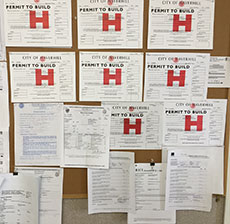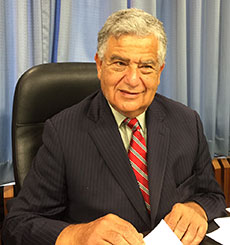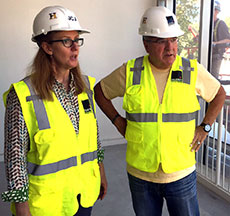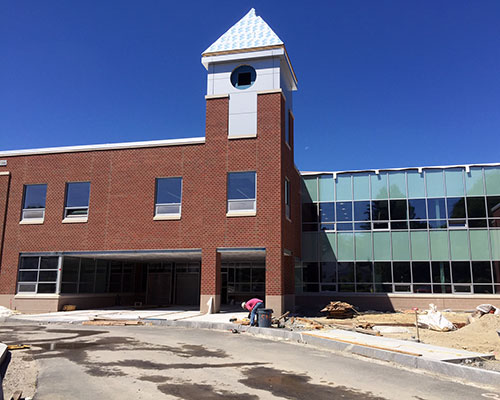The new Caleb Dustin Hunking School takes shape. (WHAV News photograph.)

Building permits are posted on the wall of a construction trailer at the site of the new Hunking School. (WHAV News photograph.)
The City of Haverhill charged the new Hunking School building project $300,000 in building permit fees—an assessment not charged to other city-owned construction jobs.
Unlike other aspects of the up to $61.5 million school building project, such permit fees are not reimbursable from the state. Also, unlike most city expenses, the $300,000 is expected to be paid by taxpayers with interest over 20 years outside of the tax-limiting law, Proposition 2 ½. This is because of the voter-approved debt exclusion. At least one building committee member is scratching his head over the expense.
“I do not understand why the city administration would increase the cost of its own project, one that was asked to be funded by the taxpayers through a debt exclusion vote,” said City Councilor Colin F. LePage, a member of the Caleb Dustin Hunking Building Committee.
The Massachusetts School Building Authority is paying 78.93 percent of eligible costs of the project, up to $40.4 million. “The costs of local building permit fees, inspection fees and any other such fees” are “categorically ineligible for reimbursement,” according to state regulations governing the quasi-independent school building authority.
Receipts show Haverhill received a $300,000 building and demolition permit fee July 2, 2015 on what was an estimated $50 million Hunking project. The building permit application was signed by John J. Hartshorn, superintendent, Shawmut Design and Construction, Boston.
School building committee members, however, say they were not aware of the $300,000 building permit assessment until a March 22 meeting this year. According to minutes of the meeting, committee members “noted they have no recollection of ever casting a vote to approve the building fee assessment against the project and felt that it would not have been passed if the proposed fee was brought up for a vote.”
Despite the presence of a required building committee, overall spending responsibility legally rests with the city administration. “The eligible applicant shall not delegate their fiduciary responsibilities to the school building committee,” reads state regulations. Mayor James J. Fiorentini told WHAV that while he has taken responsibility, city councilors were aware of the building permit fee when it passed last year’s budget.

Haverhill Mayor James J. Fiorentini during a recent school committee meeting. (WHAV News photograph.)
“Why shouldn’t they pay a fee like everyone else? It was in my budget. I certainly hope councilors knew what they were voting for. I certainly assume they did,” the mayor said. The city budget for last fiscal year was approved showing expected building permit revenue of $1,010,915—about $340,000 more than the city had received at the time the budget was drafted. Details about the surge in expected revenue are not listed.
“I stand by it. I’m glad I did it. It was the right thing to do,” Fiorentini said. He said some of the money was used for education purposes. When asked if the high school renovation or other city projects had been assessed building permits fees, the mayor responded the high school project was approved before his time as mayor and that he was uncertain about other projects.
When permits were issued for the $1.2 million the Elmo D’Allessandro police maintenance garage, no building permit fee was assessed, according to City Hall records.
LePage told WHAV he opposes the city charging itself fees and would agree to placing a law on the books to prevent it from happening again. “Yes, I would support an ordinance. This fee should not have been applied to our own city project.”
Dispute Over Maintenance Garage Brought Issue to Surface

Katy Lillian of JCJ Architecture and Haverhill School Superintendent James F. Scully during a recent site walk. (WHAV News photograph.)
To ensure the Hunking School construction project would not exceed costs approved by voters in 2014, certain expenses were omitted at the start of the project. It was left to building committee members to decide if and when to add certain extras if the project ran under budget.
Such a situation presented itself early in the project. With costs running significantly under budget, members decided to add a maintenance garage to house equipment for maintaining fields.
As early as Aug. 7, 2015, project managers Joslin, Lesser and Associates (now NV5) of Watertown presented a $24,900 proposal to design the 24- by 30-foot garage. At the time, the building was expected to cost $300,000. According to a July 31, 2015 memorandum, it would include two to three service bays for lawn mowers, snow plows and other equipment; a small room with an exterior window under a gable for the sale of concessions at sporting events; and a small office for workers. The exterior finish would match the new school.
Superintendent James F. Scully said he always believed the school should be equipped with the maintenance building.
“We have more vandalism at Hunking than any other school. There’s $150,000 worth of equipment to take care of the grounds that needs to be protected.”
When the garage project was ultimately bid, Shawmut Design and Construction proposed a $500,000 price tag. The higher price tag was attributed to the garage being introduced late—after utility contractors had already left the site. Building committee members approved the cost overrun last Feb. 16.
At the next committee meeting, however, Fiorentini said he objected to the building’s construction and would use his authority to block it. Committee members, according to minutes, reminded the mayor the maintenance building was approved earlier and Fiorentini’s office “has already signed and authorized it.”
Fiorentini recalled there was “a lot of debate.”
“I did not feel it was a worthwhile expenditure. It does have a good (silver) lining with a bathroom in the maintenance garage. It will be open to the public during events. It gives us an opportunity to have a nice park…we, more or less, reached a compromise,” the mayor told WHAV.
Minutes of the meeting report “several members…directly pointed out to the mayor that a $300,000 building permit fee was assessed against the project which, if it never occurred, would balance out the extra cost of the maintenance building.”
Despite the controversies, Building Committee Member Ernest DiBurro is proud of the project.
“We’re making excellent headway—ahead of schedule and under budget, believe it or not.” The new school opens next January for those students already attending Hunking. The remaining students will enter the new school the following September.


This is not anything new in the city of Haverhill. The charging of fees to “city departments” has been going on for years. Some of the losses at the city owned Hale Hospital and Glynn Memorial Nursing Home could be attributed to “city charges” for things like snow removal, etc. I think it is awful that the true picture is not given to the taxpayer so we can make informed choices and decisions. I wonder if the Hale debt would exist had we known what fees the city was charging the Hospital and the Nursing home and then telling everyone they had to be sold due to the losses? Maybe we could have managed these city owned facilities a bit better.
You are correct. For example,The Mayor charges the water dept budget for an office in city hall. He has been doing this for years and nobody seems to care ! Very interesting that he can legally do that.Never underestimate an ambulance chasing attorney !
WOW is all I can say!
At a meeting at Hunking School while this project was still in the proposal stage, I specifically asked the question, “What happens when the costs exceed the budget? Will the Commonwealth of Massachusetts pay additional costs?” ANSWER WAS —- “NO, the state will only pay up to and what was agreed upon. Any additional costs (cost overruns) must be borne by the City of Haverhill and its taxpayers.”
NEXT QUESTION……. “What happens when we do go over budget?” Answer was……. “Won’t go over budget, because there is an overseer of the budget who makes sure the budget is re-allocated to accommodate any unexpected expenses.”
I walked out of that meeting thinking that somehow and eventually, the taxpayer was going to be screwed!
Well….. the project was voted upon and approved by all who had stars in their eyes thinking about a new school, and who campaigned and pushed for a new school, and by those who were convinced that “new technology” could, should, and would be put into place that would make everything wonderful again, that all of the possible overages had been considered and included in the budget.
So, we reap what we sow. Did no one know what they were voting for? Is the School Committee to blame? Is the City Council to blame? Did no one keep their eye on the ball? You tell me!
In fiscal year 2013 the corrupt mayor increased taxes by 2.5% from the previous year’s budget. The city then ended the budget year with a $3.5MILLION surplus. This is money paid by taxpayers and then never used. Of course, the money was never returned to the people who paid it…the city just kept it. The City of Haverhill operates under a “Traditional Budgeting” process…which means new budgets start from the funding point of the previous year’s budget…as opposed to “Zero Based Budgeting” where each new budget’s spending needs to be justified on a line item basis each year. For each subsequent budget after the 2013 FY the corrupt mayor never removed the $3.5MILLION that wasn’t needed to operate the business of the city in that fiscal year. For 4 years the corrupt mayor has been collecting $3.5MILLION each year for which there is no identified expenditure. The corrupt, thieving mayor has over $14MILLION hidden away in the city’s finances where it just sits, increasing with each new fiscal year . He can’t just come out and use the money to pay down the Hale Hospital debt, or invest it in capital improvements, because that would reveal the trickery and theft of this money from taxpayers that he’s been pulling the past 5 years. So any opportunity he sees to spend the money “out” of hidden accounts and then pay the city it’s own money “into” a real city account makes the money legitimate from an accounting perspective. He’s actually pulling off a from of money laundering with this scheme. This is going to happen increasingly in the future through unusual expenditures like this one, through the surprise discovery of accounts with large sums of money in them, and through raises and increased hiring within the city.
When Colin LePage “suddenly” (wink, wink) finds an account with large sums of money in it and makes it public to make himself look like a hero, remember…him and every other city councilor is a co-conspirator in this theft by signing off on the corrupt mayor’s budget every year.
So the Mayor basically “stole” $300k from his own budget by double billing for that garage. That is what happened and it seems not many people care about it. Isn’t this illegal ? He is adding a fee on a project to pay for something else. Amazing the steps this guy will got to but why not nobody cares ! So the taxpayers pay not only the $300k but interest on those fees as well for 20 years ! Crazy.
“unlike most city expenses, the $300,000 is expected to be paid by taxpayers…The building permit application was signed by John J. Hartshorn, superintendent, Shawmut Design and Construction” –
Shawmut doesn’t reach the realm of crony capitalism that The Fish Family does in Massachusetts and Haverhill, but they certainly do pretty well with just over $100K in political campaign contributions, including donations to Democratic House Political Action Committee which has just over $1.5 million in its war chest.